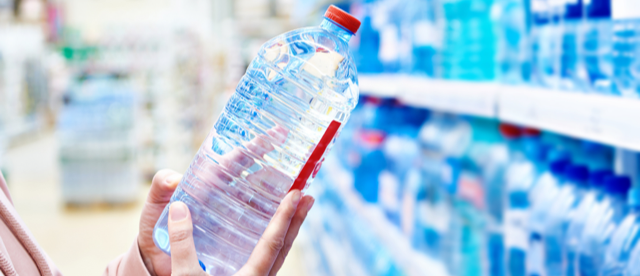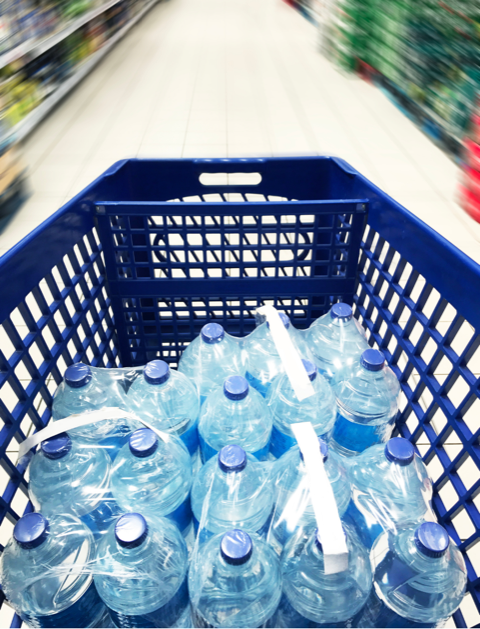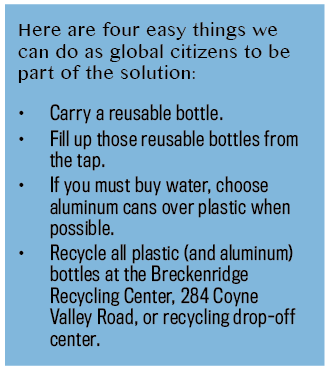Drink Our Water Not Bottled Water

Drink Our Water Not Bottled Water to Save Money and the Environment
I’m waiting patiently in the checkout line. It’s high winter season and the floor is wet from snowy boots. The market is filled with people pushing shopping carts as they weave in and around retail stands and other shoppers to find their line and give themselves a little covid-distance. The atmosphere is light, slightly manic infused with smile-wrinkles above masks.
It’s been a strange year. At that moment, what stands out to me are the many shoppers with two or three cases of single-use plastic bottles of water. It’s not a new phenomenon; I’ve seen it for years and wonder why they are spending so much money on bottled water in Breckenridge and our mountain town communities? Really? Do these shoppers realize that it’s very possible that those expensive single-use bottles were filled from a local water source not far from here? Shaking my head, I want to tap them on the shoulder and whisper, “You don’t need to buy water here, just grab a reusable water bottle and fill it at the tap,” but I know it’s a bigger issue than just that.
In 2016, sales of bottled water surpassed soft drink sales in the United States. That was the year that the world was awakened to the fact that our plastic habit was now a crisis of plastic waste that was clogging our waterways, polluting the oceans, and littering the interior of our country. Plastic bottles of water are the evil nemesis of local and global environmental stewardship.

So why bottled water instead of tap water?
That’s a loaded question. Many factors contribute to the world’s plastic addiction, which dates back to 1973 and the patent of the first PET (Polyethylene terephthalate) bottle by Dupont Scientist Nathaniel Wyeth. What followed launched the bottled water craze embraced and marketed by fashionable beverage corporations, billions of people in developing countries with limited access to clean water, corporate boardrooms, local gyms, and pop-culture icons toting bottles of Evian as their beauty secret.
Furthermore, the public’s confidence and trust in municipal water filtration systems and supply have been eroded by the corruption and inaccuracies spewed by politicians and managers in the water and sanitation sector. The bait-and-switch on contamination levels and water supply chains feed into the public’s distrust and many turn to bottled water as a blanket solution for clean drinking water.
Consequently, on a global scale, a million (1,000,000) plastic beverage bottles were purchased every minute, according to data from Euromonitor International’s global packaging trends report published in 2017 by The Guardian.
Single-use plastic bottles need up to 47 million gallons of oil per year to produce.
Less than 20% of plastic bottles are recycled.
Plastic bottles produce up to 1.5 million tons of plastic waste each year.
The bottled water and beverage aisle at the grocery stores is packed three or four shelves high with endless brands and varieties of bottled water. Some bottled water comes from springs; more than 25% of bottled water comes from other municipal supplies. For instance, just 60 miles south of Breckenridge, Chaffee County is rethinking a measure that allows global-conglomerate Nestle Waters to pump, truck, bottle, and sell up to 65 million gallons of water a year from the Arkansas River.
“What many visitors don’t know is that the raw water that we treat comes from the Blue River basin and is mostly snowmelt. It is very good water quality,” says Gregg Altimari, Breckenridge Water Division Assistant Manager. “We have a brand new state-of-the-art water treatment plant that produces excellent drinking water at a very reasonable cost to our customers.”
In Breckenridge, the raw water supply is at the top of the water food chain, and the quality of tap water produced follows the Colorado Department of Environmental Health Drinking Water Standards and Regulations. In addition, the process is overseen by the U.S. Environmental Protection Agency (EPA).

Because bottled water is shipped over state lines and considered food, the U.S. Food and Drug Administration (FDA) is responsible for the safety of bottled water. The FDA does not enforce as stringent restrictions on the bottled water industry.
So if our water supply is good enough for national companies to bottle and sell, why do I see visitors spending hundreds of dollars on cases of bottled water, including Nestle Water, at Breckenridge’s local grocery store?
Jessica Burley, the Sustainability Coordinator for the Town of Breckenridge, says, “We have a (town) council who shares the same concerns about bottled water as you express. As Gregg Altimari outlines, “our water is perfectly safe to drink, and it’s a matter of education. If the statute is repealed, I can see a program similar to the bag fee or straight-up banning bottled water, but that will be a huge uphill public battle to balance visitors’ needs/wants.”
The statute Burley refers to is in Section 7 of the Colorado Revised Statutes, 25-17-104, which bans municipalities from banning plastic food packaging.
Jeffrey Bergeron, Breckenridge Town Council member, agrees, “A solution might start with the removal of the statute, visitor education including messaging and signage promoting the quality of Breckenridge’s water source.” Bergeron adds, “Putting a deposit amount on every plastic bottle redeemable when recycled may motivate people to recycle bottles and encourage drinking the tap water.”
Is charging a redeemable deposit the way to go like the New York State Returnable Container Act? Mark Murray, executive director of Californians Against Waste, says “recovery of plastic waste won’t improve much until it is given greater value, achieved through the additional cost of the product. If a company chooses to sell me water in a single-serving container, I should have to pay the full cost of delivering that water in a single-serving container, which includes recovering the container as waste. These voluntary efforts are nice. But the key is getting the pricing right.”
by Courtney Kenady
Learn more about Colorado’s mountain towns & communities here: https://mtntownmagazine.com/colorado-mountain-towns-guide/
MTN Town Media Productions | Celebrating Colorado’s mountain culture and lifestyle
Copyright ©2021 Mountain Town Magazine all rights reserved.
Post Sponsored by

